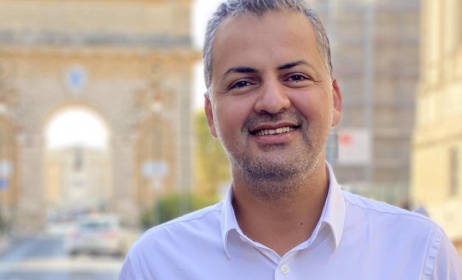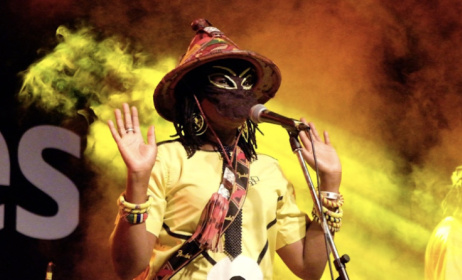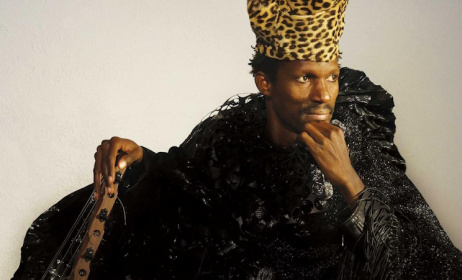Mafikizolo: We are not threatened by amapiano
South African Afropop duo Mafikizolo have withstood the tests of time, ranging from losing their founding member, Tebogo Madingoane (in 2004), to the emergence of popular genres such as gqom and amapiano - yet the group remains one of the popular and most sought-after acts in Africa.
 South African Afropop duo Mafikizolo.
South African Afropop duo Mafikizolo.
With a music career spanning more than two decades, Mafikizolo has amassed a huge following in the country and abroad. The group has won several awards and performed at big events in the country and around the continent. This has earned them various collaborations with artists such as Wizkid (Nigeria), Davido (Nigeria), Jah Prayzah (Zimbabwe), Diamond Platnumz (Tanzania), DJ Maphorisa (South Afruica), Tresor (South Africa), May D (Nigeria), Kly (South Africa) and Gemini Major (Malawi).
To date, Mafikizolo boasts eight albums, namely Mafikizolo, Music Revolution, Gate Crashers, Sibongile, Kwela, Van Toeka Af, Six Mabone, Reunited and 20. Last year, we spoke to Mafikizolo members Theo Kgosinkwe and Nhlanhla Nciza about their latest 'Ngeke Balunge' single, late band member Tebogo Madingoane, amapiano, the streaming business and their upcoming studio album, which is set for release this year.
MUSIC IN AFRICA: What are you trying to achieve with ‘Ngeke Balunge’?
Theo Kgosinkwe: Our new single is called ‘Ngeke Balunge’, meaning 'they will never succeed'. It’s a love song, which can mean many things. You can say ngeke balunge, meaning those enemies who have been trying to destroy your relationship will never succeed because your love is solid. You can interpret it in a scenario where people try to destroy your friendship but cannot succeed for the same reason. It can be an African Romeo and Juliet scenario, where both families are trying to stop a relationship from happening because, for example, they don’t like the Tswanas or ‘why are you marrying a Tswana or a Zulu?’ So, in that scenario and despite all the negatives, the couple will stay together hence the outside forces won’t succeed.
Nhlanhla Nciza: That was us in the studio, but once the song goes out and reaches the people, everyone will have their own understanding and they can interpret it in their own way. For us it was like a vibe song, and the feedback we are getting is massive. Some people are saying they get emotional while listening to the song because of its melody. Even people that don’t understand the language are impressed and they ask us ‘what is this song about'? We are getting this feedback from people in Nigeria and Zambia. Honestly speaking, we never anticipated that kind of feedback and reaction, we just thought people would love the melody and dance to the song, but ‘Ngeke Balunge’ is doing something else to other people.
Artists are inspired by different scenarios during song composition. Was there an incident that inspired the making of ‘Ngeke Balunge’?
Theo Kgosinkwe: I would say when we work on song production, we have different teams comprising producers and songwriters, who are all involved in the production of the song and we also allow producers to come in and present their music to us. So in this case, we worked with a producer from KwaZulu-Natal Province called Mondli Ncobo and you never know what goes into a producer’s head. But we think he had a sense of unity and saying ‘we are strong in this relationship that we are in’. So I think the song was inspired by whatever he was going through and can be taken in different scenarios, which reminds me of the day we did ‘Kona’. People didn’t know what ‘Kona’ was all about - they interpreted it differently and we had to explain what the song is about. Fans raised questions such as ‘is it a spiritual song? Or is it a celebratation song? It reminds me of a message that I got from a Nigerian guy who said ‘I love this spiritual song.’ He obviously doesn’t know what ‘Ngeke Balunge’ is all about. To him it means ‘we are going to fight in a battle’. It's nice that a song takes different shapes because it will penetrate various places.
You spoke about relationships and sorry to take you back down a sad memory lane, and this reminds me of the late Mafikizolo member Tebogo Madingoane. How have you been coping as a band since he died?
Nhlanhla Nciza: (deep sigh) It was honestly a hard decision to go back into the studio and work, but it was also about ‘what are we going to do as the Mafikizolo group’? It was like losing a family member, which made it difficult for us to say ‘are we going to replace him?’ ‘What are we going to do since we are known as a trio’? We felt it was going to be different, since someone is missing - he brought in a different vibe, because Theo and I are singers whereas Tebogo was more of a rapper. He brought in a different element altogether; we are both from Kagiso and he was from Soweto. If you know townships, each township has its own vibe. But I think what made us strong and to continue working as Mafikizolo, has always been a dream of making Mafikizolo one of the biggest bands. We felt that if we don’t continue working on this dream, then we won’t be doing justice to Tebogo and what he wanted for the band because we believe that he is still with us. Tebogo, unfortunately, passed away when we were beginning to get recognition and that was the time when we released ‘Ndihamba Nawe’, which became the biggest song. His dream was to build his mother a house and look after his son. He wasn’t happy about where his mother was living and because of the success of the Sibongile album, even though he wasn’t around, the proceeds built his mother the house he wanted. So if we had discontinued Mafikizolo after Tebogo’s death, we wouldn’t have done justice to him and his child. What we are also doing is to leave a legacy for our children. We also felt that we need to continue as Mafikizolo and we sat down with the record company because there was this question: ‘Are we replacing him or we will continue without him?’ We reached a conclusion that we will not replace Tebogo so to keep his memory alive.
I was going to ask how did you come with the idea of not replacing him and it reminds of an interview I did with Ladysmith Black Mambazo. They said they practice with a few young members every week so that they know who to recruit into the group in the event that a member dies or decides to leave the group. Did anything like this come to mind?
Theo Kgosinkwe: It wasn’t something that was up for a discussion, it wasn’t something that we thought about as in ‘what are going to do? Are we going to look for another member?’ It was like ‘no we are not going to do that’. So we would like to thank our record company for sitting down with us and accepting the decision that we wanted, and I think they also felt it was the right decision to make - and it allows us to always remember that he is still part of us.
There is so much noise about amapiano in the streets and the genre is seemingly taking away most artists from their comfort zones. Don’t you guys feel threatened by amapiano music?
(Both laugh)
Theo Kgosinkwe: We have been in the industry for 22 years, but it's good for the industry because it shows growth and a new generation that is coming in.
Nhlanhla Nciza: When you are 22 years in the industry, you see many things come and go, even the genres. Can you imagine how many genres were there 22 years ago? It’s basically what’s happening when gqom was the top genre and right now its amapiano. There was an era when we had bubble-gum, kwaito, Afropop, followed by hip hop. We have remained true to our ourselves and the songs and that could be the reason people continue to love our music. Can you imagine a situation where we start singing hip hop simply because hip hop is popular? Let the hip hop guys have their fans and the same applies to amapiano, but that doesn’t mean we will say no to an amapiano artist who approaches us for a collaboration. We are open for collaborations and Mafikizolo is one band that loves experimenting. If an artist comes with something that is doable for Mafikizolo, something that does not take away our authentic sound, then we can go into the studio together. We have worked with hip hop artists before, so it’s all about being true to ourselves. We have to do it in such a way that we don’t lose our fans.
Most artists are benefiting through the streaming business. Where does Mafikizolo stand on this?
Theo Kgosinkwe: We are comfortable! The streaming business is changing the music industry and we have to adapt, learn and be relevant. We have to check our audience and fans who have been supporting Mafikizolo back in the days, to see if they are comfortable with the idea of streaming or they are too old to stream. We take notice of those things and we are working with a social media team and a digital team at Universal Music that deals with that.
As Mafikizolo, are you happy with the state of affairs in the local industry?
Theo Kgosinkwe: There are a few changes that are happening which are going to affect musicians. There are companies that are coming in and are saying they want to have our music for free and give it away for free. They want certain laws to be changed.
Are you referring to the copyright amendment bill?
Theo Kgosinkwe: Yes! It does affect us, for example Apple Music comes and says: ‘I am not going to buy this music but I want it for free’. They talk with whoever they talk with and say ‘we are bringing this much as Apple but we'd rather have the music for free.’ And other things besides music are going the same way: when a composer composes a song, they can only keep it for a certain period of years and, after that, anyone can use it for any use without the composer’s consent. This affects the composer’s investment plans and their inheritors won’t benefit. What happens to the legacy that you want to leave for your kids?
Nhlanhla Nciza: You can’t always be a singer for you to be in the music industry; you can write songs and make a living out of that. All of sudden someone takes that away from you when it’s the only thing you have – your God-given talent. But all these things have not been implemented yet, we still have time as musicians to fight them. Everyone who wants to safeguard their intellectual property should be involved and make sure that the bill doesn’t pass.
When are you planning to release another album?
Theo Kgosinkwe: Next year. This single is a warm up ahead of the album release, we are already working on that, some songs are done and some are not. You can look forward to something like ten tracks on the album. We have amazing collaborations on the album. There is a song with Wizkid, we also featured Harmonize (Tanzania), Jah Prayzah (Zimbabwe), Yemi Alade (Nigeria) and Syleena Johnson (US). We currently making sure that we have a strong album for next year.



























Commentaires
s'identifier or register to post comments